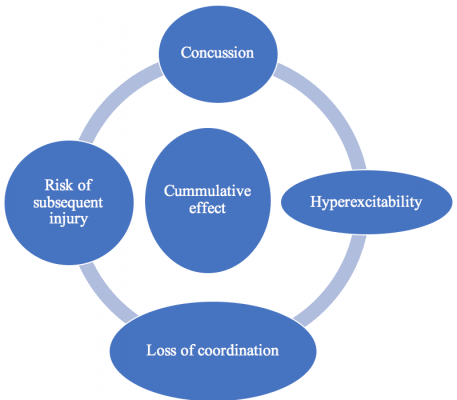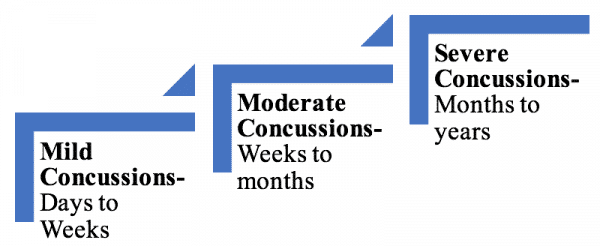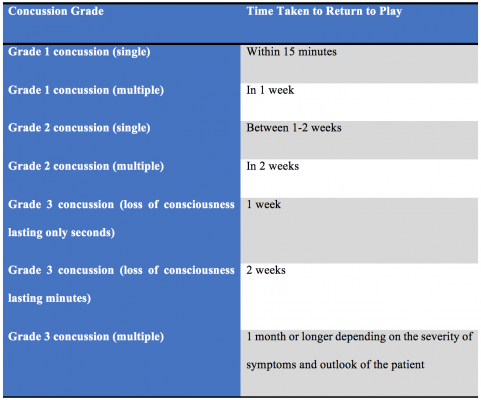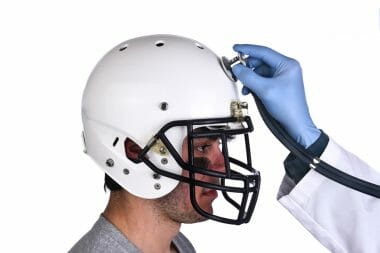Concussions and CTE What You Need to Know 6 Part Series Part 2 … Part 1 is here
Part one covered concussion, risks leading to it and preventive measures. However, often with all the required precautions taken carefully, concussions still occur. So, you need to know how to identify and deal with a concussion and what complications can arise if it goes untreated.
Are concussions something I should worry about or can concussions turn into something serious?
Since a concussion is considered a mild head injury with flimsy symptoms, it’s hard to identify it in the first place. This potential delay in diagnosis often leads to complications. It’s a head injury after all and alters the chemical balance in the brain. That chemical imbalance, if not fixed in time, is likely to cause brain damage in long term, hence needs careful attention immediately.
However, numerous cases of concussion go missing in athletes and since they keep on playing without providing proper recovery time, the cumulative effect often ensues with destructive results.
Short-term effects of concussion
The short-term effects are mild and symptoms recover on their own without treatment, if you rest properly. Some of the immediate changes you feel after a concussion are:
- Loss of consciousness for a short period or multiple episodes
- Loss of memory of recent events
- Post-traumatic headaches
- Pallor (pale appearance)
- Weakness
- Nausea
- Vomiting
- Vertigo
- Dizziness
- Tinnitus (ringing sensation in ear)
Long-term complications of concussions
The long-term complications can by physical as well as psychological. They can be classified as:
Physical symptoms
- Post-concussion syndrome
Post-concussion syndrome is, in fact, prolonged recovery period of a concussion. If a head injury isn’t given enough time and treatment to heal, it tends to stay with symptoms showing for months. Some post-concussion syndromes last for years. These symptoms include:
- Lack of focus
- Attention deficit
- Headache
- Nausea
- Vomiting
- Tinnitus
- Irritability
- Reduced cognitive function
- Sensitivity to noise
- Fatigue
These symptoms, although sounding mild, have a tendency to impair your normal functionality and life activities. They also make you prone to repeated concussions and eventually the cumulative effect of multiple injuries which constitutes serious brain damage. They severely affect your work routine and many people have reported a decrease in their job hours.
- Epilepsy
Among many neurological sequels caused by concussion, epilepsy is a serious one. Concussion can alter the blood flow to an area of the brain that controls coordination. That leads to seizures and in severe cases, epilepsy.
Another rationale behind these seizures is that sudden blow to the head overexcites neurons of a certain brain area and releases excessive neurotransmitters. These excessive neurotransmitters alter the chemical state of the brain and cause seizures.
“Concussion can alter the blood flow to an area of the brain that controls coordination. That leads to seizures and in severe cases, epilepsy.”
Research shows that people with a history of one or more concussions are twice likely to suffer from a seizure.
- Alzheimer’s disease
If you ever have suffered a concussion, you must have experienced a short—term memory loss. Alzheimer’s disease is a prolonged form of this symptom.
Multiple concussions build a cumulative effect and cause brain damage. Your memory deficit increases and brain function dwindles, causing structural changes in your brain. It occurs rarely, but a risk nevertheless, particularly in patients with prior history of multiple head injuries.
- Chronic traumatic encephalopathy (CTE)
As the name indicates, this problem is due to long-term minor head blows. Multiple small injuries culminate into physical and cognitive defects like Parkinsonism and, as described above, Alzheimer’s.
It’s also called punch drunk syndrome because it was first discovered in boxers that suffer from multiple concussions during the game. It also leads to depression, anxiety, mobility limitations, tremors, slurred speech, visual problems and other neurological symptoms due to structural and chemical changes in the brain.
- Second-impact syndrome
Second-impact syndrome is rare but several cases have arisen and experts emphasize the risk group to keep an eye on it. If a concussion is followed by another head injury within a period of week or month, second-impact syndrome becomes a potential complication. The repetitive abuse doesn’t give you brain enough time to stabilize itself and it swells in the reaction.
Now, brain swelling is serious business! Scientists are still doing research to find the underlying mechanisms but as the complication is fatal and death can occur within minutes, the data is limited. One hypothesis that is considered valid states that repetitive blow hinders blood circulation in the brain and stops cerebral flow in a certain brain area. As a result, that area swells, increasing intracranial pressure. An increase in intracranial pressure is likely to herniate the brain and severely fail the brain stem. The vital functions in your body like respiration etc. stop resulting in a life-threatening situation.
Psychological complications
Apart from physical disorders caused by structural and functional alterations in the brain, some psychological problems are also prevalent. The general limitation in functionality and disability associated with symptoms of concussion can cause an emotional turmoil and ensues the feelings of worthlessness. The structural changes in the brain also contribute towards psychological problems.
“Apart from physical disorders caused by structural and functional alterations in the brain, some psychological problems are also prevalent.”
The most common psychological symptoms associated with a concussion include:
- Anxiety
- Depression
- Sleep disorders
- Irritability
- Changes in pattern of appetite
- Lack of motivation
Cognitive function also decreases and patient experiences decrease in general well-being.
How long does it take to recover from concussions?
If you want an honest answer, there is no way to know.
It may sound grave but that is the truth. Brain concussions are a complicated matter and influenced by a lot of different factors making it extremely unpredictable. The recovery process is complicated and varies from person to person.
In the case of mild concussions, the subjects usually recover- almost completely- within a period of 7-10 days.
A moderate form of brain concussion can take a significant toll and the consequences can last a long time. In a research conducted at the University of Ottawa, Canada researchers studied the changes in 22 individuals who had suffered brain injuries. These individuals were assessed 5 times over the period of 3 months. Also, these individuals were compared with normal subjects of similar age, sex, and educational background.
Upon follow-up, researchers found that the concussion group did not differ much from the normal group when it came to reaction time of ordinary tasks. Though, there was a lag of a few milliseconds.
But, when it came to the comparison of reaction time for more skilled activities requiring a greater degree of attention, most of the candidates belonging to the concussion group performed poorly. This trend continued even until the third month after the initial injury.
But things get pretty serious when it comes to major or severe concussions. You may be able to shed the plethora of symptoms in the first few days of the initial insult but that’s just the tip of the iceberg. As mentioned above, the severity of concussions is one of the major determining factors when it comes to the long-term consequences and rehabilitation. In the severe forms of concussions, the remnants of injury last for years or even decades.
Following is an illustration of recovery pattern in different grades of concussions.
Is it ok to participate in contact sports following repeated concussion episodes?
The American Academy of Neurology has proposed the time a player needs to return to play based on the grade of concussions. According to the guidelines, the players should not be allowed to return to play during this time.
The most important thing here is that you should get your healthcare professional on board. You can’t make the decision of getting back on the field all on your own. While you might be looking fine on the surface, something sinister might be going on deep inside. That’s why, a careful and thorough medical assessment is extremely important while making the decision of getting back to your sport.
“The most important thing here is that you should get your healthcare professional on board.”
Also, it is equally important that you do not hide your symptoms or injury just because of the fear of dropping out of your team or sport. While this practice may do you some temporary good but it might have drastic consequences in the long run.
The role of nutrition and how it effects brain health will be addressed in part 3 of this 6 part series.











Reply